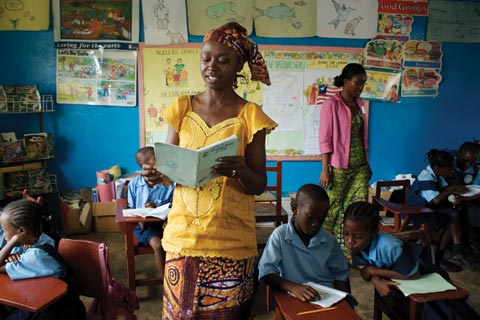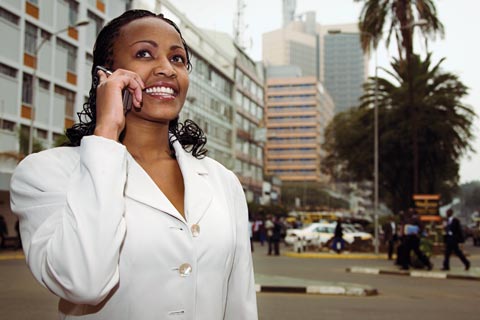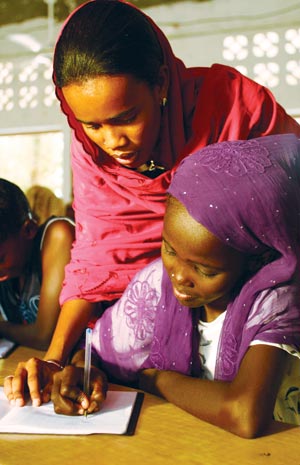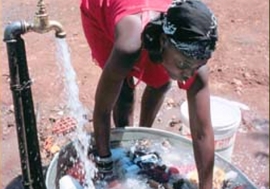Battling for equality on all fronts
Battling for equality on all fronts
 Classroom in Liberia: Half of all African countries have made moderate improvements in reducing the gender gap in education.
Classroom in Liberia: Half of all African countries have made moderate improvements in reducing the gender gap in education.A decade-and-a-half ago, after a ground-breaking 1995 conference in Beijing that set ambitious targets to transform the lives of women worldwide, African women had reason to expect change. Like their counterparts elsewhere, African women are asking why progress has been limited and are seeking ways to overcome the obstacles.
In 2005, Rachel Mayanja, then special adviser to the UN Secretary-General on gender and the advancement of women, announced progress in the implementation of the Convention on the Elimination of All Forms of Discrimination against Women (CEDAW), a UN protocol, as well as the development of new policies and guidelines and creation of networks of gender experts.
Currently, only South Sudan, Sudan and Somalia among African countries have not ratified CEDAW, adopted in 1979 by the UN General Assembly and often described as the international bill of rights for women. South Sudanese women’s rights activists are currently agitating for ratification of CEDAW.
While briefing the Women’s Committee of the European Parliament in early 2011, the executive director of UN Women, Michelle Bachelet, lauded the efforts of Egyptian women in pushing for democracy. She cautioned, however: “Don't let that presence, that participation, that perspective disappear. Democracy is not only about voting, it is also about inclusion, pluralism, diversity ... and I think now there is a tremendous opportunity for women, even if lots of help is needed.”
Poverty has a woman’s face
Out of the 1995 conference emerged a plan, the Beijing Platform of Action, which laid out areas that need improvement if the position of women was to be advanced. The areas include reducing poverty among women, stopping violence, providing access to education and health care and reducing economic and political inequality. Barring some notable exceptions, progress in these areas has been slow.
For many African women, the Beijing platform and the various international instruments their governments have signed have yet to translate into positive changes in their daily lives. They remain at the bottom of the social hierarchy, with poor access to land, credit, health and education. While some of the agreements that African governments have ratified enshrine property and inheritance rights, in most countries women are denied those very rights.
Compounding the situation are setbacks such as the HIV/AIDS pandemic that is destroying the health of more women than men in Africa and eroding some of the development gains women had attained. As a result, poverty in Africa continues to wear a woman’s face, notes Ms. Gladys Mutukwa of the Zimbabwe-based non-governmental organization Women in Law and Development in Africa (WILDAF). She finds it disturbing that since the Beijing conference, African women are much poorer.
A UN Food and Agricultural Organization study on Benin, Burkina Faso, Congo, Mauritania, Morocco, Namibia, Sudan, Tanzania and Zimbabwe shows that women rarely own land. When they do, their holdings tend to be smaller and less fertile than those of men. Studies also show that if women farmers had the same access to inputs and training as males, overall yields could be raised by between 10 and 20 per cent.
 Because of pressure from women, a number of African countries introduced affirmative action policies that have increased the number of women in decision-making positions.
Because of pressure from women, a number of African countries introduced affirmative action policies that have increased the number of women in decision-making positions.Getting girls into school
Perhaps the most inhibiting factor is that many women in Africa continue to be denied an education, often the only ticket out of poverty. Disparities between girls and boys start in primary school and the differences widen through the entire educational system. Although Africa, of all regions, registered the highest relative increase in primary school enrolment during the last decade, it is still far from attaining parity. The good news is that by 2011, sub-Saharan Africa had significant girls’ enrolment. Together with South Asia, primary education level enrolment in sub-Saharan Africa rose to 23 million, up from 20 million a decade earlier.
Policies specifically targeting girls were responsible for notable improvements in countries such as Benin, Botswana, the Gambia, Guinea, Lesotho, Mauritania, Namibia and Liberia. In Benin, for instance, the gender gap has narrowed, thanks to policies such as sensitizing parents through the media and reducing school fees for girls in public primary schools in rural areas.
Yet various hurdles hamper the expansion of education in Africa. Households that became poorer often face the stark choice of deciding who to send to school — and often it is the girl who stays home. Costly tuition, mandatory school uniforms, long distances between home and school, and inadequate water and sanitation, all help to restrict girls’ access to education.
Citing 2008 data, the UN Educational, Scientific and Cultural Organization (UNESCO) reports that more men than women are literate in Benin, Burkina Faso, Cameroon, Niger, Nigeria and Uganda, with a gender gap ranging from 12 per cent to 26 per cent. Nevertheless, about half of sub-Saharan African countries have registered moderate increases towards gender parity in this area, UNESCO reports.
 For women and girls, education is often the only ticket out of poverty.
For women and girls, education is often the only ticket out of poverty.Channelling money to women
Many now acknowledge that to enable women to escape poverty, development policies should place more emphasis on their contributions to the economy. Even though women make up a significant proportion of the economically active population, their contribution is not fully recorded because they are mainly engaged in family farming or in the informal sector. In other cases, what they do, such as household work, is not considered an economic activity.
In agriculture, sub-Saharan Africa’s most vital economic sector, women contribute 60–80 per cent of labour in food production, both for household consumption and for sale. But while they do most of the work, they lack access to markets and credit. In Uganda, women make up 53 per cent of the labour force, but sell only 11 per cent of the cash crops.
To redress the bias in macroeconomic policies that favour men and boys at the expense of women and girls, a number of African countries have adopted a tool known as gender budgeting. This involves analyzing government spending choices and their impact on women and men, boys and girls, with the aim of better identifying disparities. Kenya, Rwanda, South Africa, Tanzania and Uganda are among the countries currently assessing their budgets along gender lines.
Influencing policy
Almost all countries in Southern Africa have a national government body that deals with gender issues. However, these units, departments or ministries “have become weak and unable to be responsive to the challenges presented by the struggle for gender justice,” NGOs declared at an African Social Forum in Lusaka, Zambia. “Poor resource bases, few staff and no power or authority within governments to advance equality and justice for women are just a few of the constraints.”
In some countries, the presence of women in parliament has made a difference in the adoption of gender-sensitive policies. Because of pressure from women, some countries now have affirmative action policies, such as quotas, to increase the number of women in decision-making positions. In South Africa, women parliamentarians succeeded in passing various pieces of legislation, such as those legalizing abortion, countering domestic violence and ensuring child support.
In Uganda, women parliamentarians helped to adopt legislation making rape a capital offence. In 2003, following a long delay, Mozambique passed a family law considered pivotal for the emancipation of women in that country. In Liberia, where a woman was elected president in 2005, a law making rape a serious crime has been passed.
Efforts by gender activists to protect the rights of women paid off when in 2005 the African Union decided that the African Charter on Human and People’s Rights should become operational. The AU Executive Council in 2006 elected judges to the African Court on Human and People’s Rights.






















